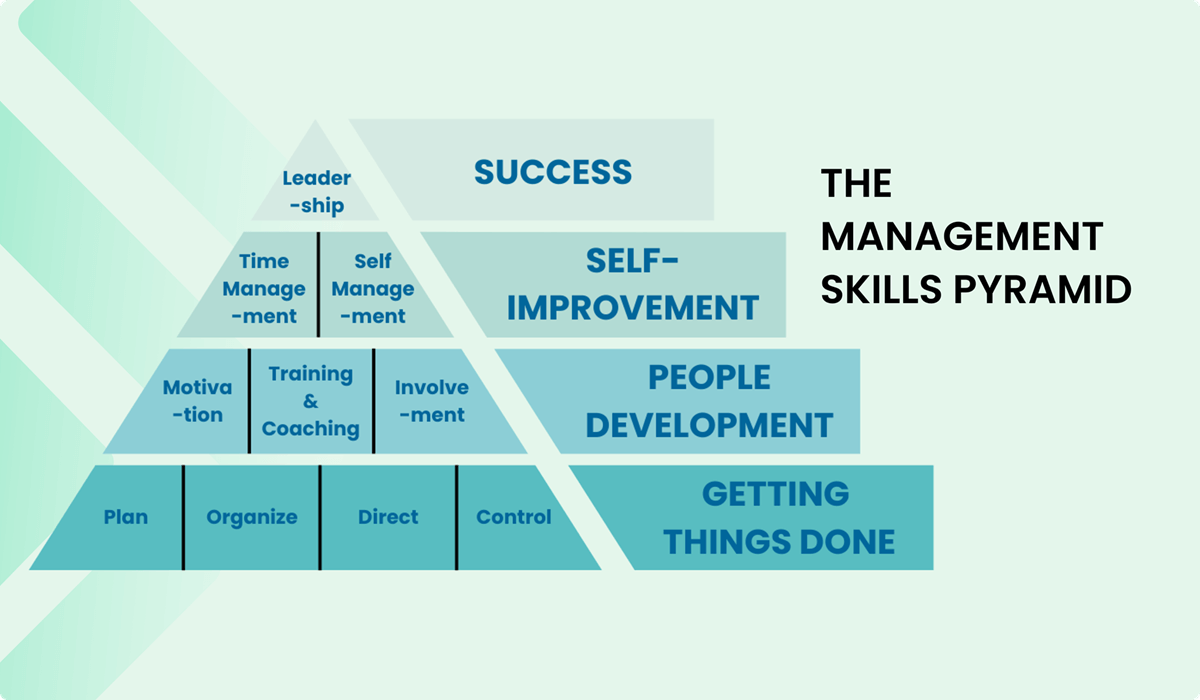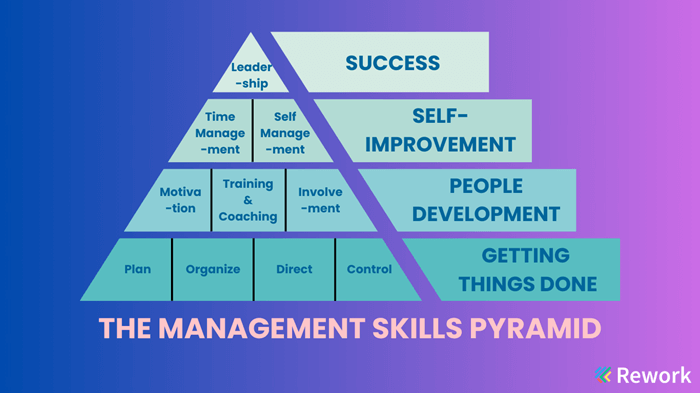Leadership
4 levels of management skills: A development roadmap for managers

If you're a manager looking to take your skills to the next level but aren't sure where to start, this article is for you. Understanding what leadership truly means is essential before mapping your development path. The Management Skills Pyramid serves as a roadmap, breaking down essential management abilities into four clear levels. This guide will help you identify which skills to focus on now and what you'll need to develop to become a more effective and inspiring leader.
Management skills pyramid - a ranking model for managerial skills
The management skills pyramid is a structure that describes the hierarchy of essential skills for a typical manager. It includes 10 skills, divided into 4 levels, ranked from the most basic to the most advanced, with each level representing a specific goal.
This pyramid model is based on the ideas of Dr. Kammy Haynes, an organizational psychologist and HR expert with over 20 years of experience. The ranking is structured around the increasing complexity of management skills one must master to succeed as a manager. The foundational skills are at the pyramid's base, while the top represents a unique and highly challenging skill set.

Traditionally, a manager’s role was focused on basic supervisory duties such as ensuring that the team followed company policies, assigning tasks, overseeing work progress to meet targets, guiding employees, and reporting to higher management. However, over time, the nature of the role has evolved, and the required management skills have become much more dynamic.
Modern managers take on additional responsibilities, such as motivating employees, resolving internal conflicts, fostering team cohesion, onboarding new employees, and driving creative ideas. Many of these responsibilities align with emotional leadership styles that emphasize connection and influence. As a result, management skills now include a broader range of soft skills.
Ranking these skills helps provide a clear roadmap for managers to develop their competencies. You’ll know which fundamental skills to focus first and what additional abilities you need to refine to collaborate more effectively with your team. In other words, this ranking system helps you adapt and continuously improve to become the best manager possible in your position.
4 levels of management skills
The management skills pyramid demonstrates the relationship between different managerial skills, showing which skills are at the same level and which require more expertise. These skills are organized into a cohesive four-level framework.
You can use this structure to assess your managerial abilities and see if you’ve reached the highest level.
Level 1 - Getting things done
At the base of the pyramid, Level 1 includes the essential skills every manager must master to ensure the team’s work is completed on time, at high quality, and with minimal cost. These skills are the foundational principles of management. They include:
- Planning: The ability to evaluate available resources, including time and manpower, and create a well-organized work plan with a clear schedule.
- Organizing: The skill of assigning responsibilities, creating clear roles, and fostering collaboration among team members.
- Directing: The ability to guide the team, ensuring everyone adheres to the rules and performs at the required level.
- Controlling: The ability to monitor progress, analyze outcomes, and report on productivity, quality, and costs to higher management.
Level 2 - People development
At Level 2 of the pyramid structure, the number of management skills decreases, but the difficulty of each skill increases. This makes sense because, at this level, you’re not only focusing on individual tasks but also on motivating employees and building effective internal training processes. A manager’s success is closely tied to how well their team performs and how cohesive they are as a unit.
The management skills at Level 2 are all soft skills, and they include:
- Motivation: The ability to inspire and encourage employees to give their best effort and stay engaged with their work.
- Training & Coaching: The skill of imparting knowledge and experience to employees, helping them unlock their potential and develop the competence to take on current and future responsibilities. This aligns closely with Level 4 of Maxwell's leadership model.
- Engagement: The ability to involve employees in collaborative efforts to solve problems and generate new ideas, fostering a sense of ownership and teamwork.
Level 3 - Self-development
After fulfilling most of the core responsibilities of a manager, it’s time to think about optimizing those tasks and improving your own abilities. While your current role may not demand these skills immediately, as your organization grows and your team expands, staying stagnant is not an option. That’s why focusing on Level 3 management skills is essential:
- Self-management: The ability to remove personal obstacles, balance various aspects of life (work, learning, hobbies, family, relationships, etc.), and maintain productivity and well-being.
- Time management: The skill of organizing and using limited resources and time in the most efficient way possible to maximize output and effectiveness.
Level 4 - Success
At the very top of the pyramid structure, there is only one management skill: Leadership. Reaching this level means you are no longer focused on closely supervising every detail or being responsible for every task within your team. Instead, you operate on a higher plane—shaping the vision, direction, and strategies that align with the mission of your organization. This represents the fundamental distinction between leadership and management.
In terms of leadership, the concept of a leader emerges. A leader holds a position that requires much more than that of a typical manager. Exploring classic leadership styles can help you understand different approaches at this level. As the saying goes, a manager might not know how to lead, but a leader must know how to manage.
Notes on applying the management skills pyramid
Many managers strive for perfection in all the skills outlined in the pyramid, including leadership. While it’s admirable to work hard and aim for that level of success, is it necessary to follow a rigid path to get there?
The truth is, most managers operate at multiple levels simultaneously without fully mastering each one. This happens because management roles often require a mix of skills from different levels of the pyramid, and there’s no set standard for what qualifies as “enough” proficiency in each skill. For instance, a manager might excel at supervising, coaching, and managing time, but may struggle with motivating the team.
Wherever you are within the pyramid, your growth as a manager doesn't need to follow a strict, step-by-step process from Level 1 to the top. It's okay if your role requires you to develop skills from different levels at the same time. Don't feel pressured to perfect every skill simultaneously. Your responsibilities will naturally provide opportunities to refine and expand your management capabilities as you advance within your organization.
Learn More
- Leadership vs Management: Key Differences
- John Maxwell's 5 Levels of Leadership
- Situational Leadership Styles
